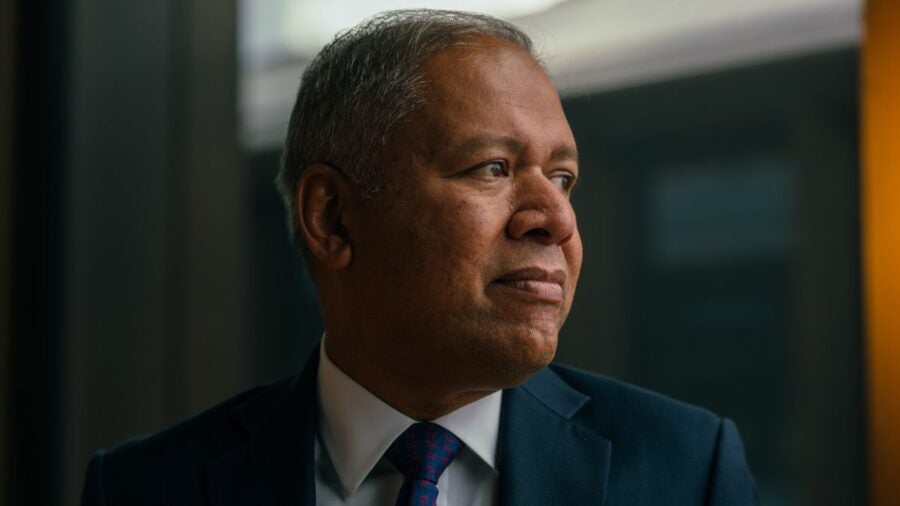
In November, Barclays CEO C. S. Venkatakrishnan shocked the business world when he revealed his cancer diagnosis. In a regulatory filing, the company said he would be undergoing treatment for non-Hodgkin lymphoma that was expected to last between 12 and 16 weeks, but that the prognosis was “excellent”.
Four months later, Venkatakrishnan confirmed that his treatment had been successful and he was now in remission. And it has not taken long for him to return to the hectic travel schedule demanded of the chief executive of a FTSE 100 company with a presence in more than 50 countries.
“I am easing into the global CEO’s travel schedule,” Venkatakrishnan said, speaking at the Wall Street Journal’s CEO Council Summit earlier today (24 May). “I’m taking fewer, but longer, trips.”
Venkatakrishnan was first diagnosed close to his first anniversary as Barclays CEO. And he admits the rigours of the job meant he had not spent as much time thinking about his own health as he had the health of the business.
“As CEOs, we spend a lot of time thinking about our companies, their business prospects and the potential risks. We don’t think about ourselves as much,” he said.
Even during succession planning, the health of the leadership is not considered that seriously, he said. While, leadership teams are often asked what might happen if the chief executive is hit by a bus, for example, Venkatakrishnan believes this is only “loosely” considered as an outcome. It was only when he felt a lump on his neck that the importance of securing the future of the team and finding a successor “hit home”.
Be prepared for unexpected questions
In his initial announcement to the 90,000-person company, Venkatakrishnan said that he planned to work through his treatment, after getting approval from his doctor. But he recalled being left “shocked” by two questions asked by Barclays employees that he was completely unprepared for.
The first was whether he would expect other members of staff to work through their illnesses, rather than taking sick leave – something he has compared to “negative virtue signalling”. The second was whether making this decisions was down to “CEO or senior management swagger”, the implication being that he wanted to look tough in front of his employees.
“Of course, it was neither,” Venkatakrishnan said. “But the thought had not even occurred to me.”
I’ve learned there are some things you can let other people do – they might even do it better than you
It’s an unfortunate reality that other leaders will face similar diagnoses during their tenure; Arthur Sadoun, the CEO of the advertising network Publicis, revealed his own just months after Venkatakrishnan. But Venkatakrishnan said leaders must watch that their actions do not put unintended pressure on employees, and that they need to be aware of how their words can impact others, especially at a time when people are more aware of the impact of work/life balance on their mental and physical health.
Because of the response to his announcement, Venkatakrishnan issued a clarification in a video interview with Barclays CFO Tushar Morzaria. “I made it very clear that [working through illness] was not my expectation,” he said. “Although I was still involved in the company, I was not overt about it.”
The second major challenge Venkatakrishnan faced was working out what jobs he could still do while he received treatment and which he couldn’t. “Even if I was still working, I couldn’t do 14-hour days, go and see clients, or continue travelling.”
He called this process of letting go “instructive”, adding: “I’ve learned there are some things you can let other people do – they might even do it better than you – and you should try to focus on what’s important for the job.”
He did admit this is easier to say that do, but that sometimes it takes facing a serious personal challenge – as he did – to focus on what’s important.
Facing economic challenges
Venkatakrishnan has made the full-time return to his global CEO role at an interesting moment for the global economy. So far this year, three US banks (Signature, Silicon Valley Bank and First Republic) have failed; the Swiss bank Credit Suisse has been rescued by UBS; inflation rates are at record highs; and the Bank of England has raised interest rates on 12 consecutive occasions (with more expected).
Some companies may find that their business models are untenable
He believes that the initial phase of the recent banking crisis is now over but still fears that economic conditions mean some businesses will have to re-evaluate their business models.
“All of us have to think about our business models,” Venkatakrishnan said. “Higher interest rates don’t just create higher costs of borrowing, they also affect what our consumers can bear in terms of what they’re paying. What you will see is that some companies may find that their business models are untenable.”
Despite Venkatakrishnan’s warning that the British economy is not “out of the woods yet”, Barclays’ own finances are in rude health (the bank posted first-quarter pre-tax profits of £2.6bn). And thankfully, having now completed his cancer treatment, so is Venkatakrishnan.

In November, Barclays CEO C. S. Venkatakrishnan shocked the business world when he revealed his cancer diagnosis. In a regulatory filing, the company said he would be undergoing treatment for non-Hodgkin lymphoma that was expected to last between 12 and 16 weeks, but that the prognosis was "excellent".
Four months later, Venkatakrishnan confirmed that his treatment had been successful and he was now in remission. And it has not taken long for him to return to the hectic travel schedule demanded of the chief executive of a FTSE 100 company with a presence in more than 50 countries.
“I am easing into the global CEO's travel schedule,” Venkatakrishnan said, speaking at the Wall Street Journal’s CEO Council Summit earlier today (24 May). “I’m taking fewer, but longer, trips.”
